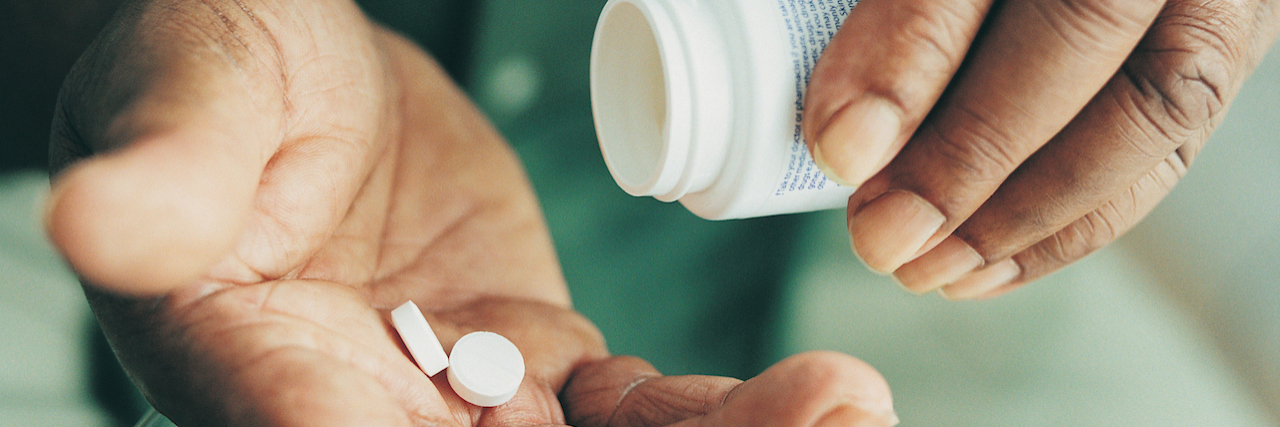What It's Really Like Relying on Medication to Cope With Chronic Illness
Editor's Note
Please see a doctor before starting or stopping a medication.
One part of chronic illness that is a given, especially when you manage multiple illnesses such as myself, is managing and making sure you take medication as prescribed. Before my heart and autoimmune issues, I was against medicine — except my birth control, the occasional antibiotic, my asthma meds and maybe some ibuprofen.
But as time droned on, I realized I faced a real life-or-death crossroads. And if I wanted to live, I would need to implement Western medicine and old school home remedies to function. I slowly went from taking birth control and an inhaler here and there, to seven medicines, three creams for my face, an inhaler in the morning and two at midday, 10 pills, three different creams for my face at and two nasal sprays at night — plus emergency meds for flares, quarterly injections and infusions. Never would I have imagined that this would be my life. But here I am, and I have come to be OK with it because it is necessary to function.
I accidentally missed a morning of medications this weekend and boy did I feel it. The entire day I kept wondering why I was so tired and why was I hurting so much. And when I looked in my pill organizer (another thing I’m still getting used to because I feel I’m too young for it, and I loathe spending my time refilling it but it’s a necessary evil of this lifestyle), my answer was there plain as day. One would think “missing one day can’t make that much of a difference.” Well, I’m here to tell you it can. When your body is actively attacking itself or when organs are not functioning as they should — and you don’t have that medication in you to manage and keep disease activity down or to make those organs function as they should — missing a dose makes a world of difference.
Now for those who question Western medicine and feel that all of this is unnecessary, thinking all I need is essential oils, yoga, a healthy diet, herbs and vitamins and whatever else, I am going to stop you. I am lucky to have a great healthcare team, and we work together to minimize how much medicine I have to take (there have been some who have wanted to put me on more, but we have worked it out to go in a different direction). It is a combination of a specific diet, exercise modified to meet what I can do and not hurt myself any further, some holistic care and other therapies to keep me standing and moving.
Until you have been in my situation and almost lost your life, literally been on your way out of here, you will not fully understand nor realize how combining these things has given me some parts of my life back. At one point I couldn’t even get out of bed or walk more than a few steps without almost collapsing. So this is a blessing for me to have a treatment plan that works. Now, nothing is ever perfect, but it allows us to do things and be OK and set a baseline so when there is a bad flare up things can be attacked aggressively, but with a better plan and with shorter treatment time.
It’s definitely a juggling act and who would have thought medication would consume so much of my time. It’s not just remembering to take it, but picking it up from the pharmacy, arguing with insurance to get it covered, making sure you have enough money to pay for them all and then organizing them. The financial piece is really real. Even though I have insurance, and it’s pretty good, I can easily spend $200 a month on meds, and that doesn’t include pop up prescriptions if I get an infection or something. That does not leave much room for anything else. But I need it. My life literally depends on it.
My hope is that you realize just how important meds are to us. You will see how they help to get us moving in the morning or help us sleep at night. They help us, they give us some of our life back, and you can’t put a price on that.
Getty image by Digital Vision

